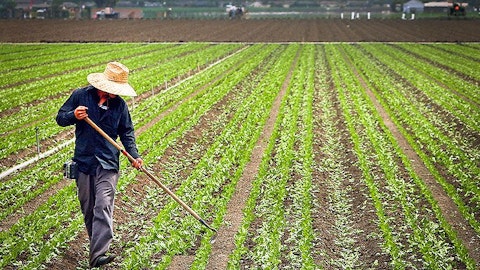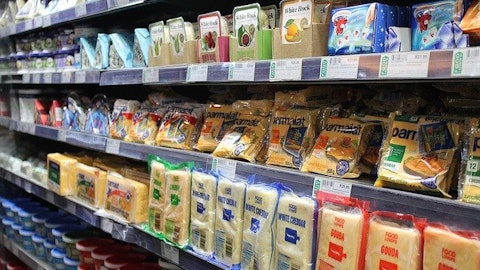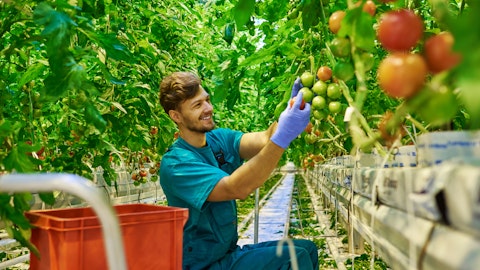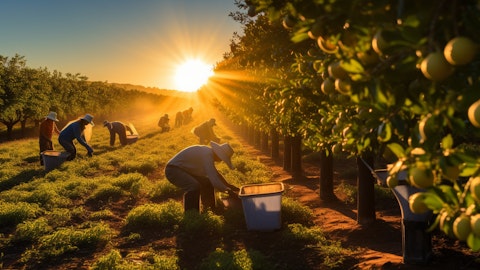Jacinta Devine : Hi, good morning, Adam. I suppose first of all, just to restate that 2023 was positively impacted by a couple of things, the unwind of consumable stocks from the supply chain disruption in 2022, and that was a positive for us. And also, one of the important things in our industry is the impact of seasons over quarters, and in particular, the Chilean cherry season over the year end. So that had a positive impact, a very strong positive impact for Q4. As we go into 2024, we’ll see the usual outflow of working capital that we would typically see, maybe a little bit heightened because of the inflow we had in Q4. And so working capital, we wouldn’t expect to see the same benefits from working capital going into 2024, as we’ve seen in 2023. Other things, part of the things I’ve called out would be like-for-like Adam, based on the current year.
Adam Samuelson: Okay, that’s helpful. Just one other quick follow-up. The income, discontinued operations was actually income in the quarter. What the fresh vegetable business does in EBITDA in fourth quarter and for a full year ‘23?
Jacinta Devine : We don’t break that out separately, but our underlying performance is better year-on-year, but we don’t break out adjusted EBITDA for the veg segment any further.
Operator: Our next question comes from Gary Martin from Davy.
Unidentified Analyst : Hi, Rory, this is Dan Yuhan, just first off, congrats on a really, really strong year. Just a few questions on my side. I guess just kind of starting off and I’m conscious, I know you can’t really give kind of too much too many details on the Progressive deal until it’s closed, but I guess maybe just kind of some high level color whether the deal was opportunistic in nature, maybe kind of dial in to just how the kind of the nature of the product portfolio differed to diversify into Americas. That’s just my first question. And then just second, I think it’d be useful just to kind of dial in to some of the moving parts around costs, and just how you see that evolving in FY24? Thanks.
Rory Byrne: Okay, I mean, Progressive, I suppose as an organization, we’ve always tried to be opportunistic and agile and flexible in terms of how we look at business. And we’re not normally sellers of businesses like this. In this particular case, it’s a very much a standalone segment, focused on potatoes and onions, asparagus, and a few other products that are a little bit unique for our American operations. I suppose the minority shareholders that we had 35% shareholder. They wanted to explore liquidity options legitimately, so we as well, obviously looking at value, looking at the interest rates remaining high, perhaps even the absolute level of debt, hoping and overhang to some degree on our share price. Again, something that I had landed the call earlier as you know, this unusual circumstance where you have the private market valuations are higher and significantly higher in some cases than the public market valuations, it is a little bit hard to understand that this is the growth group, the group with the asset base we’ve got with the customers we’ve got, with the services we’ve got, that it warrants a significantly lower overall rating than one subsection, which is a good business of the business.
So putting all of those together we’ve got an attractive offer and we decided to take it. And then on your second question, on costs and input costs and that, yes, which we’re seeing stability in some of the input costs at the farming level, cartons, fertilizers, inputs like that. And then at the international freight level, there have been some significant reductions, but obviously that’s a whole pass through in our two diversified divisions and being able to fix costs in our own shipping primarily in the first group division. So I think that stability though makes managing and planning a little bit better, it’s helpful to the consumer, it may encourage more volume throughput to the system, particularly with freight rates or a product source out of Chile or South Africa or other long-haul products.
So, a more balanced and a moderation of inflation in those categories for sure.
Operator: Our next question comes from Chris Barnes from Deutsche Bank.
Christopher Barnes: Hi, thanks for the question. I just wanted to ask on the diversified EMEA business. I mean, throughout the last year, you drove nice like-for-like growth in revenue and EBITDA as well as margin improvement, particularly in the fourth quarter. So could you maybe just unpack the drivers of that performance on the top line and on profits and what’s underpinning your confidence that you can continue to drive strong performance over, on this elevated base over 2024?
Rory Byrne: Yes, I think we’ve got a strong position in many European markets with a number one player in Sweden and Denmark and Spain, in UK and Ireland, strong position in Holland, strong position at our Hamburg office in Germany, and number one position in Czech Republic. So you put all of that together with strong customer base, mature business, well-developed team. And I would also say that we had some favorable tailwinds in 2023 that a lot of those businesses all work pretty well. They’re solid, steady, consistent growth businesses. So we’re optimistic that we can continue on that path. There are, I think I said in the introductory remarks as well. They are ripe for some further consolidation in food service and wholesale, some smaller businesses, we’re constantly looking at adding in, not material acquisitions, but interest in bolt-on acquisitions within that segment, which should help to continue the growth path for that division.
Christopher Barnes: Got it, that’s helpful. And then I just, I had a follow-up question on the Progressive Produce transaction. I believe it was consolidated in the Diversified Americas segment, but correct me if that’s wrong.
Rory Byrne: That’s correct, Chris.
Christopher Barnes: Okay, got. Is there any reason to believe that the margin profile of Progressive was materially different from the balance of the segment? Or is it roughly in the same ballpark, 2% to 3 %? Thanks.
Rory Byrne: I think we’ll give, we’ve said with the Q1 numbers, when we get the transaction close, we’ll give a little bit further color on that Chris but for the moment and we won’t go into that any further.
Operator: Thank you. We don’t have any questions as of the moment. I’d now like to hand back over to the management for the closing remarks.



